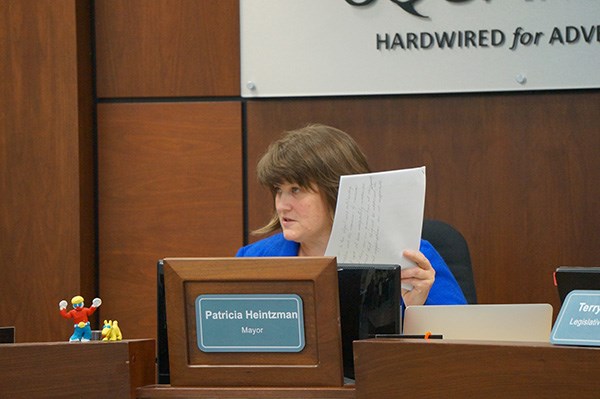For the average homeowner in Squamish, this year could see an additional $250 district tax hit to the pocket book. That’s about $21 per month more of the family budget going to municipal taxes.
The District of Squamish draft 2015-2019 budget was unveiled on Monday evening at a special council meeting.
The draft 2015 budget includes a 3.6 per cent property tax revenue increase, a 9.5 per cent utility fee increase for water and sewer, and a 34 per cent increase in solid waste fees due to the new district composting program.
In 2014 the property tax revenue increase was 5.14 per cent.
A key driver in determining the budget is staffing – 46 per cent of district expenses are for staffing, according to Christine Mathews, financial planning manager for the district.
The Squamish RCMP contract is about $4 million and also impacts the budget, said Mathews.
Other factors that have an impact on the budget include aging infrastructure that has to be replaced. The district provides a lot of services, Mathews said.
“We automatically expect our toilets to flush and our taps to run water and I think sometimes we forget that those things are happening, but they do cost a fair bit of money to try and keep those services running and to try and keep the infrastructure up and supported,” she said.
Squamish has a limited tax base, said Mathews.
“We are what I would call a teenaged phase of a municipality,” she said, “so our tax base is still relatively small across British Columbia municipalities.
“Our tax base is pretty much 97 per cent residential and small business. That is obviously unlike some other municipalities that have some fairly major industrial components.”
Squamish homeowners account for 63.8 per cent of the tax burden, while the B.C. average is 62 per cent. Businesses in Squamish bear 25.1 per cent of Squamish’s tax burden while the B.C. average is 20.5 per cent, based on 2014 B.C. Local Government Statistics.
For a homeowner whose house is worth about $490,000, annual taxes will go up by about $118, or 5.06 per cent, meaning the average homeowner will pay about $2,449 in municipal property tax in 2015 if the proposed budget passes. Utility taxes for that same homeowner will increase by about $131, according to district documents.
For a strata unit dweller, with a home assessed at about $284,000, taxes will go up by about 4.26 per cent over last year, or $58, equaling about $1,362 in property tax this year. Utilities will go up as for other homeowners by $131, based on the size of the tote chosen, bringing the total increase to about $190 this year.
Based on a medium garbage container, the 2015 cost to an average homeowner for utility taxes – including water, sewer and garbage –is about $1,132, according to the draft budget document from the district.
The main focuses of the draft financial plan, according to Mathews, are cycling and pedestrian infrastructure, safe routes to schools, improved public engagement, and improving development and growth processes.
Some of the spending highlights of the budget are a $15,000 contribution to the public art reserve, funds to the Olympic Legacy Trail, Squamish Legacy Sports Park and Howe Sound Curling Club ice upgrade, funds for the Hendrickson Ball Fields lighting, and flood protection initiatives.
Mayor Patricia Heintzman said that this budget aligns with the current council’s strategic vision for the district, but more of this council will be seen in future budgets.
Only a few citizens were on hand for the budget discussion. Auli Parviainen questioned a reduction in economic development spending in the 2015 budget.
“Am I to understand that there is no plans of keeping that funding in economic funding in economic development, which is one of the key objectives of the council?” she asked. “I am OK with increasing my taxes, I just want to see value.”
Councillor Jason Blackman-Wulff said the district had seen a lull in terms of development and interest in the community, so a lot of projects were shelved in the past.
“We are getting the sense, over the last six months, that there is a lot of interest in the community both from developers as well as potential businesses that do want to relocate, and so right now we have got to make sure we have the resources in place in terms of staff to process those development applications,” he said, adding that originally council was looking at an eight or nine per cent property tax increase this year.
“We had to make some difficult choices.”
The budget has to be approved by May 15.
To offer feedback on the proposed budget go to the district website, squamish.ca and click on the budget icon.



